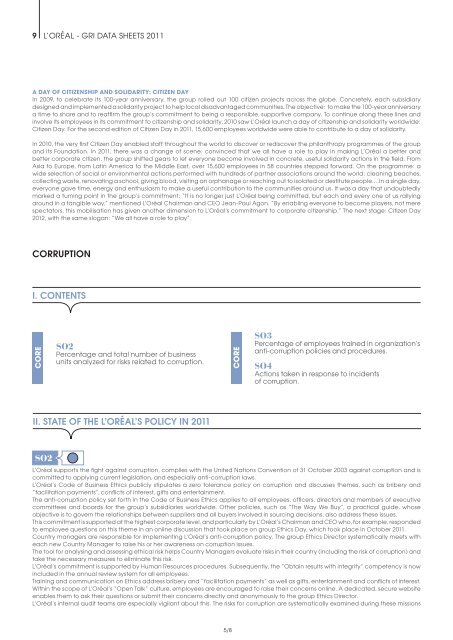Organizational Strategy - Sustainable Development - L'Oréal
Organizational Strategy - Sustainable Development - L'Oréal
Organizational Strategy - Sustainable Development - L'Oréal
You also want an ePaper? Increase the reach of your titles
YUMPU automatically turns print PDFs into web optimized ePapers that Google loves.
9 L’OréaL - GrI DaTa SHEETS 2011<br />
A DAY OF CITIZENSHIP AND SOLIDARITY: CITIZEN DAY<br />
In 2009, to celebrate its 100-year anniversary, the group rolled out 100 citizen projects across the globe. Concretely, each subsidiary<br />
designed and implemented a solidarity project to help local disadvantaged communities. The objective: to make the 100-year anniversary<br />
a time to share and to reaffirm the group’s commitment to being a responsible, supportive company. To continue along these lines and<br />
involve its employees in its commitment to citizenship and solidarity, 2010 saw L’Oréal launch a day of citizenship and solidarity worldwide:<br />
Citizen Day. For the second edition of Citizen Day in 2011, 15,600 employees worldwide were able to contribute to a day of solidarity.<br />
In 2010, the very first Citizen Day enabled staff throughout the world to discover or rediscover the philanthropy programmes of the group<br />
and its Foundation. In 2011, there was a change of scene: convinced that we all have a role to play in making L’Oréal a better and<br />
better corporate citizen, the group shifted gears to let everyone become involved in concrete, useful solidarity actions in the field. From<br />
asia to Europe, from Latin america to the Middle East, over 15,600 employees in 58 countries stepped forward. On the programme: a<br />
wide selection of social or environmental actions performed with hundreds of partner associations around the world: cleaning beaches,<br />
collecting waste, renovating a school, giving blood, visiting an orphanage or reaching out to isolated or destitute people….In a single day,<br />
everyone gave time, energy and enthusiasm to make a useful contribution to the communities around us. It was a day that undoubtedly<br />
marked a turning point in the group’s commitment: “It is no longer just L’Oréal being committed, but each and every one of us rallying<br />
around in a tangible way,” mentioned L’Oréal Chairman and CEO Jean-Paul agon. “By enabling everyone to become players, not mere<br />
spectators, this mobilisation has given another dimension to L’Oréal’s commitment to corporate citizenship.” The next stage: Citizen Day<br />
2012, with the same slogan: “We all have a role to play”.<br />
CORRuPTION<br />
I. CONTENTS<br />
CORE<br />
SO2<br />
Percentage and total number of business<br />
units analyzed for risks related to corruption.<br />
II. STATE OF THE L’ORÉAL’S POLICY IN 2011<br />
SO2<br />
L’Oréal supports the fight against corruption, complies with the United Nations Convention of 31 October 2003 against corruption and is<br />
committed to applying current legislation, and especially anti-corruption laws.<br />
L’Oréal’s Code of Business Ethics publicly stipulates a zero tolerance policy on corruption and discusses themes, such as bribery and<br />
“facilitation payments”, conflicts of interest, gifts and entertainment.<br />
The anti-corruption policy set forth in the Code of Business Ethics applies to all employees, officers, directors and members of executive<br />
committees and boards for the group’s subsidiaries worldwide. Other policies, such as “The Way We Buy”, a practical guide, whose<br />
objective is to govern the relationships between suppliers and all buyers involved in sourcing decisions, also address these issues.<br />
This commitment is supported at the highest corporate level, and particularly by L’Oréal’s Chairman and CEO who, for example, responded<br />
to employee questions on this theme in an online discussion that took place on group Ethics Day, which took place in October 2011.<br />
Country managers are responsible for implementing L’Oréal’s anti-corruption policy. The group Ethics Director systematically meets with<br />
each new Country Manager to raise his or her awareness on corruption issues.<br />
The tool for analysing and assessing ethical risk helps Country Managers evaluate risks in their country (including the risk of corruption) and<br />
take the necessary measures to eliminate this risk.<br />
L’Oréal’s commitment is supported by Human resources procedures. Subsequently, the “Obtain results with integrity” competency is now<br />
included in the annual review system for all employees.<br />
Training and communication on Ethics address bribery and “facilitation payments” as well as gifts, entertainment and conflicts of interest.<br />
Within the scope of L’Oréal’s “Open Talk” culture, employees are encouraged to raise their concerns online. a dedicated, secure website<br />
enables them to ask their questions or submit their concerns directly and anonymously to the group Ethics Director.<br />
L’Oréal’s internal audit teams are especially vigilant about this. The risks for corruption are systematically examined during these missions<br />
5/8<br />
CORE<br />
SO3<br />
Percentage of employees trained in organization’s<br />
anti-corruption policies and procedures.<br />
SO4<br />
actions taken in response to incidents<br />
of corruption.






